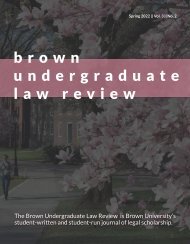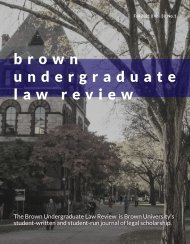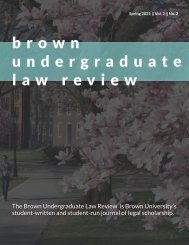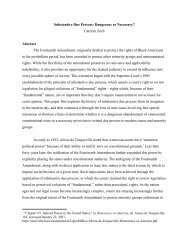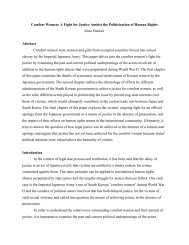From Frontiero to the Air Force: Citizenship and Equal Protection in U.S. Reproduction Jurisprudence
Olivia Siemens '21
Olivia Siemens '21
You also want an ePaper? Increase the reach of your titles
YUMPU automatically turns print PDFs into web optimized ePapers that Google loves.
disqualified women from claiming the right to seek gainful employment while simultaneously
reaffirming this same right for men. 5 In reserving a different set of rights for each gender, the
Court in essence created two distinct and unequal classes of citizenship, each entitled to a
different range of constitutional liberties. Section One of the Fourteenth Amendment defines
citizenship and its corresponding rights as follows:
All persons born or naturalized in the United States and subject to the jurisdiction
thereof, are citizens of the United States and of the State wherein they reside. No
State shall make or enforce any law which shall abridge the privileges or
immunities of citizens of the United States; nor shall any State deprive any person
of life, liberty, or property, without due process of law; nor deny to any person
within its jurisdiction the equal protection of the laws. 6
In Bradwell, however, the Court explicitly refused to acknowledge that women were entitled,
under either the Privileges and Immunities or the Equal Protection Clause of the Fourteenth
Amendment “to engage in any and every profession, occupation, or employment in civil life.” 7
While the decision referred to women as “citizens,” it outright rejected the notion that female
citizenship conferred upon women the same rights as male citizenship did men. Men, the more
“rational” and “civic-minded” sex, could claim full republican citizenship, including the right to
earn a living and contribute to the economic prosperity of the nation. Women, on the other hand,
were deemed “[unfit] for many of the occupations of civil life” and thus confined to a separate
“domestic sphere” of citizenship. 8 The Court’s implication here is self-evident: women enjoyed
only those rights deemed appropriate to the nature and abilities of the female sex. Bound to
respect the whims of political representatives they did not elect—and lacking both procedural
and substantive constitutional remedies—women in the early republic were subject to a
government of men, not of laws.
Republican Citizenship: Representation and Equality
The passage of the Nineteenth Amendment in 1920, which barred states from denying a
person’s right to vote based on her sex, carried with it the prospect that American women might,
for the first time, enjoy the same citizenship stature as their male counterparts. Once granted the
5
Ibid.
6
U.S. Const. amend. XIV, §1.
7
Bradwell, 83 U.S. 130.
8
Ibid.
4




